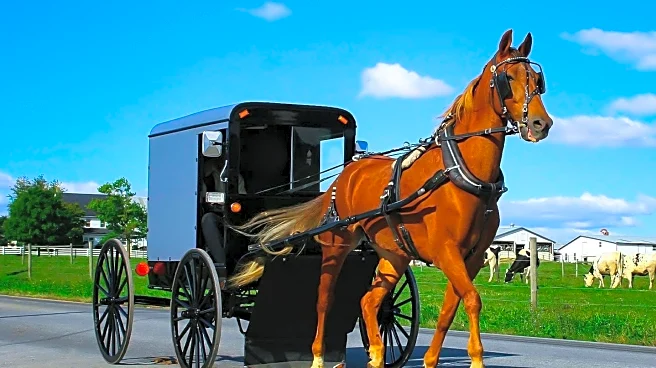What is the story about?
What's Happening?
A series of photographs has captured the essence of Amish agriculture and farming practices in east central and northeast Ohio. The images, taken near Maysville and Fredericksburg, Ohio, showcase various aspects of Amish life, including traditional farming techniques, community activities, and the natural beauty of the region. The photographs depict scenes such as Amish farmers tending to crops, families participating in produce auctions, and the serene landscapes surrounding Amish farms. These visual stories provide insight into the sustainable and community-oriented lifestyle of the Amish, highlighting their commitment to agriculture and self-sufficiency.
Why It's Important?
The documentation of Amish farming practices offers a valuable perspective on sustainable agriculture and community living. As modern farming faces challenges related to environmental impact and sustainability, the Amish approach provides an alternative model that emphasizes harmony with nature and resourcefulness. By showcasing these practices, the photographs contribute to a broader understanding of how traditional methods can coexist with contemporary agricultural needs. This insight may inspire other communities to adopt similar practices, promoting environmental stewardship and sustainable living.
What's Next?
The photographs may lead to increased interest in Amish farming techniques, potentially influencing agricultural research and policy. As more people become aware of the benefits of traditional farming methods, there could be a shift towards integrating these practices into modern agriculture. Additionally, the documentation may encourage tourism and educational initiatives focused on Amish culture and sustainable farming, fostering greater appreciation and understanding of this unique way of life.
Beyond the Headlines
The Amish community's commitment to sustainable agriculture raises important questions about the future of farming and environmental conservation. Their practices challenge conventional agricultural norms, offering a model that prioritizes ecological balance and community well-being. This approach may inspire broader discussions on how society can address environmental challenges through traditional knowledge and practices, potentially leading to innovative solutions for sustainable development.

















